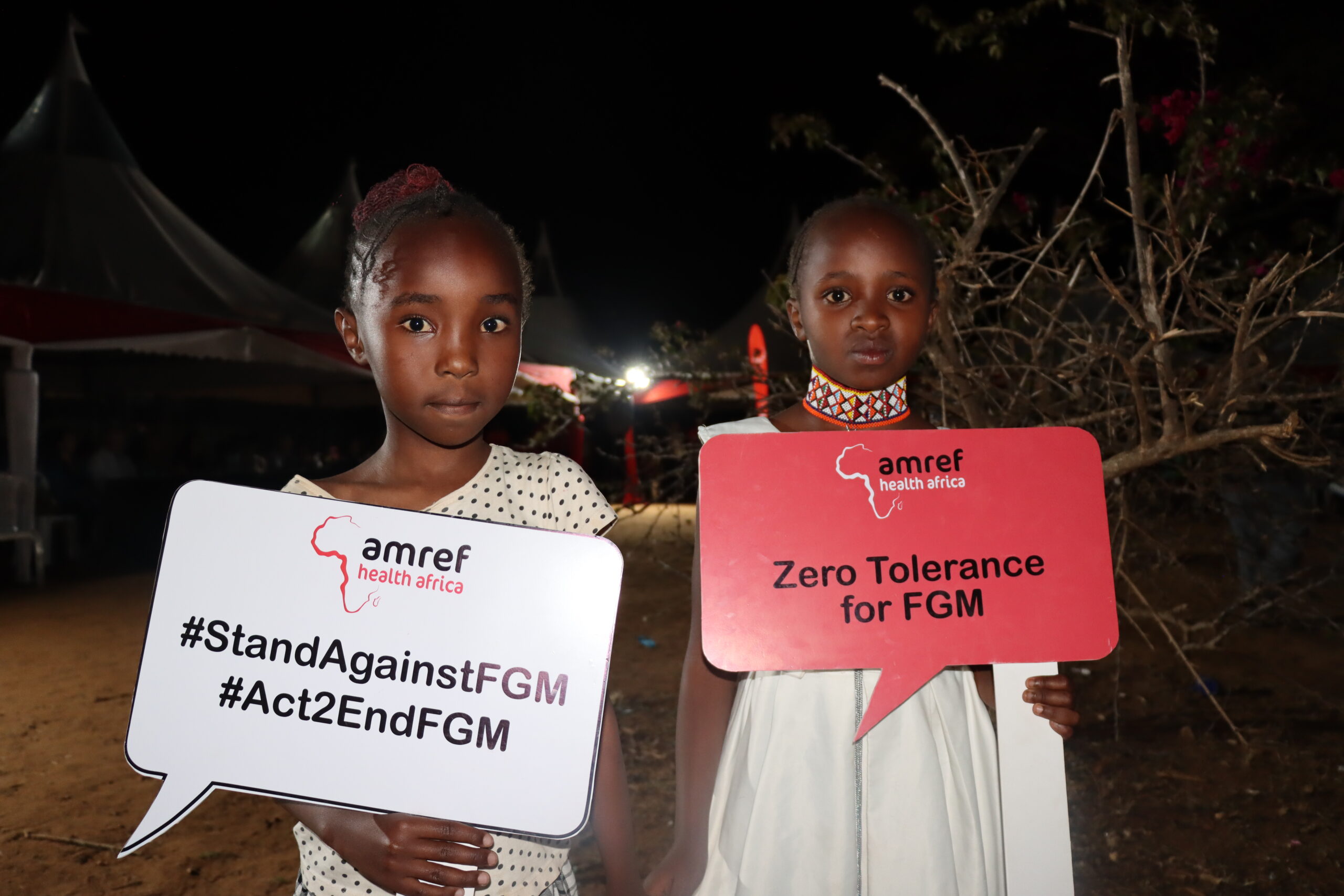

420 Girls in Kajiado Central Choose Education Over Female Genital Mutilation/Cutting
December 5 – 8, 2022: As the sun sets on the dusty terrain of Maparasha Primary School in Kajiado Central, 420 young girls dressed in kaleidoscopes of colour wash their clothes in anticipation of the Community Led – Alternative Rite of Passage (CL – ARP). In Kenya, UNFPA estimates that around 21% of girls and women between the ages of 15 and 49 have experienced some sort of Female Genital Mutilation/Cutting (FGM/C). FGM/C is practised as a traditional rite of passage in many parts of the country. Culturally, it implies that a young girl has transitioned from childhood and is ready to step into the role of marriage and motherhood.
For over three decades, Amref Health in Africa has been implementing CL-ARP as a strategy to end FGM/C while respecting indigenous cultures by mimicking the ‘traditional’ initiation ritual but with the omission of the physical cut.
The CL-ARP strategy involves a three-day workshop where girls rife for FGM/C – aged between 11 to 19 years – are brought together and educated on sexual and reproductive health and rights, dangers of FGM, children’s rights, substance abuse and basic communication skills to boost their self esteem.
On this occasion, the community-led initiative brought together the custodians of culture and decision makers including elders, morans, religious leaders and county administrators to ensure that the young girls and women have a robust support system and the tools to be the best version of themselves without having to undergo the antiquated patriarchal practice.
The event was graced by the area, MP Hon. Kanchory, Elijah Memusi lauded Amref’s commitment to ending the harmful practice saying “The work done by Amref to fight FGM/C in Kajiado is becoming a legacy in this community by empowering young Maasai girls to take up more space and become agents of change in their communities.”
Hon. Memusi highlighted that the girl population in high school in Kajiado is low since most girls succumb to early FGM/C which prepares them for early marriage and pledged his support to ensure that those caught breaking the law against FGM/C are punished. He reiterated that “to move forward as a country, we can’t play short of other players, because girls and women are an important part of development and progress in the community. We can only achieve this if we support our young girls and encourage them to stay in school”.
Mr. Denge Lugayo – Amref’s Programme Manager lauded the girls who had chosen to pursue education instead of succumbing to the retrogressive culture. He appreciated their parents and the community leaders for choosing the CL-ARP and supporting Maasai girls to achieve
their dreams. “Community-led – ARP is a sustainable and important facet in the fight against FGM/C because it engages all decision-makers at the grassroots level through dialogue to support the most vulnerable in society,” he said.
On the last evening CL-ARP ceremony culminates with songs and dance where the girls participate in a beauty and knowledge contest to empower their self-esteem. It is followed by candle lighting as a sign of choosing education for a better future instead of FGM/C and early marriage.
During the last day of the workshop, the girls are also joined by elders who give them blessings in form of traditional chants to forego the harmful culture and pursue their education.
The girls are also given sanitary towels and books which provide the much-needed relief during school holidays, hence preserving their dignity, which is essential to maintaining self-esteem and confidence, instead of opting to undergo FGM/C or seeing marriage as a solution.
The project administrator Christine Kasaine also explained that the project has established a digital tracking system which is used to monitor and follow up on girls who go through the CL-ARP process and provides information on their education, health and socio-economic status until they turn 24 years old. “So far we are tracking 3,000 girls from past ARPs in Kajiado and today we have added another 420 girls who we will continue empowering so that they are relieved of early pregnancy, early marriage and associated diseases like sexually transmitted diseases and fistula” Christine emphasized.
Six months after the CL-ARP process, the community also helps to facilitate a follow-up on the girls who graduated. Additionally, there is a girls’ symposium that occurs a year after each ARP, where all the girls who took part in the initiative assemble to share their journeys and the challenges encountered after graduation. The symposiums help to find ways to mitigate the challenges and have revealed that CL-ARP has a 98% success rate.
Author: Edna Musa, Communications Officer, Amref Health Africa in Kenya.
"When the drumbeat changes, and we have seen the drumbeat changing, we need to adjust…
By Rahul S Reddy Kadarpeta, Jane Nyambura, Leonora Mbithi Over the past decade, several African…
Despite decades of progress, malaria continues to rise globally, with a child dying from malaria nearly every…
The era when Africa could rely on foreign aid for its health priorities is coming…
Attending the Africa Health Agenda International Conference (AHAIC) 2025 in Kigali, Rwanda, was truly eye-opening. As Africa…
African health care leaders said innovative financing solutions will be essential to prevent the collapse…